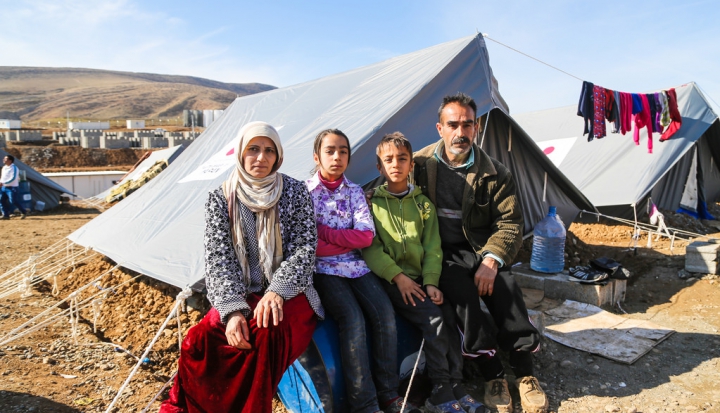Every minute, 24 people across the globe leave their homes behind and become refugees—roughly 24 per minute, according to the United Nations Refugee Agency. The recent travel ban by President Donald Trump that forbids refugees from seven countries to enter the United States complicates this exodus.
More than 21.3 million refugees today have fled their home countries; more than half are children. Most are living in camps in countries such as Kenya, Jordan, and Pakistan. Many will never return home and are dependent on the compassion of strangers.
Some believe that the U.S., with a quota of 110,000 per year, allows too many refugees into the country. Trump has issued an order to cut that number to 50,000 and, over the past weekend, eliminated entrance for many.
Following President Trump’s proposed moratorium on refugees entering the United States, a few strident Christian voices, such as Franklin Graham, the evangelical preacher and son of Billy Graham, have endorsed his proposal. Yet far more Christian leaders, both Catholic and Protestant, have decried such a move as antithetical to the teachings of Christianity.
Religious organizations such as Catholic Charities, Church World Service, and Lutheran Immigration and Refugee Service are directly involved in the process of resettlement. Unfortunately, too few Christians know what mainstream Christian churches teach on the topic of refugees and immigration.
As a theology scholar, I can attest that discussions of morality in popular Christian discourse too often focus on sexuality and reproduction. But the global refugee crisis, particularly the influx of refugees due to the ongoing war within Syria, is also a moral issue.
Concern for refugees is grounded in scripture. The Hebrew Bible admonishes us to care for the widow, the orphan, and the stranger. Love and devotion to God is shown through care for society’s most vulnerable. In the New Testament, the Gospel of Matthew describes how Jesus himself was a refugee, telling the story of how the holy family fled the violence of Herod’s killing of the innocents.
The Christian response to refugees’ plight is a call to active compassion. The word compassion literally means “to suffer with.” We are called to respond to those seeking refuge in our country with compassion. We are called to let their stories break open our hearts. Worshipping a God who is Love must deeply inform all of our actions.
As Christians, we have a responsibility to the men, women, and children fleeing their homelands. These people do not get to choose what country they go to. Once they enter a tent city, they are not allowed to leave until they have been through a thorough vetting process and sent to their new assigned home. If they are lucky, that process may take two to three years. If they are not, their children will grow up in the camps, new babies will be born, the elderly and frail will die.
Pope Francis puts our responsibility toward refugees bluntly: “It’s hypocrisy to call yourself a Christian and chase away a refugee or someone seeking help, someone who is hungry or thirsty, toss out someone who is in need of my help,” he said. “If I say I am Christian, but do these things, I’m a hypocrite.”
You might expect Christian leaders to applaud Trump’s proposed priority to religious minorities, presumably Christian minorities in majority Muslim countries. However, a “Christianity First” policy decries the central command of the Judeo-Christian tradition, which is to love God and neighbor.
Jesus’ parable of the Good Samaritan calls us to reflect on what it means to be neighbor to one another, especially to those in need. It reminds us that often the person who acts with compassion is not the person who looks most “religious.”
In the story, the neighbor is the one who practices a different religion and who is often seen as an enemy. The gospel does not call us to be neighbor to those most like us, but to those most in need. The focus of the church’s teaching on refugees is that we must focus on those who are most vulnerable. That group may include religious minorities, but it isn’t limited to minority groups.
To be sure, many will express concerns about the danger of terrorists coming in through the refugee process. Some may point to recent terrorist incidents in Europe and the fear that they will be repeated here. But very strict vetting processes are already in place; the vetting process in the U.S. is much more comprehensive than what had been used in Europe to accommodate the emergency nature of the crisis.
When we look at incidents in our own country, often terrorists are “home grown,” not refugees who came into the U.S. from another country fleeing violence and persecution.
President Trump’s distrust of the current vetting process appears to be a staged moment rather than a relevant concern. These are people, not platforms. This is not about talking points, it is about women and children whose homes have been destroyed, families who have lost everything and are in need of the basic decency of human compassion.
The recent shootings in a Quebec mosque that killed six worshippers invoked a response from Pope Francis, who said, “The Holy Father firmly condemns the violence that engenders such suffering, and begs the Lord for the gift of mutual respect and peace.”
Christian ministers must find the courage to do the same: to take a strong stance from the pulpit, reiterating the biblical message of care for the stranger, the widow, and the orphan. They have the ability to bridge the gap between what the church says and the anti-refugee, anti-Muslim, anti-immigration stance so many Christians seem to have adopted.
Ministers can play a role in helping people name their fears, not just the expressed fear of a terrorist attack, but the deeper fear of the stranger, the xenophobia that enables this anti-refugee rhetoric to take hold.
Yes, we may have to face our fears, but perfect love casts out fear.
When we look back at the Holocaust or the situation in Rwanda, history judges how we protected ourselves and our own interests, how we let our fear or our apathy rule us.
We look back at horrific stories of human suffering and ask ourselves if we could not have done more. If we let fear dictate public policy and how we respond to the most vulnerable in our world, then we have let the terrorists win.
History will repeat itself, and love will lose. When fear wins, Christianity loses.
Correction: A previous version of this article stated that Billy Graham is dead. Graham, who retired in 2005, is still alive today.
Image: Flickr cc via IOM | UN Migration Agency














Add comment